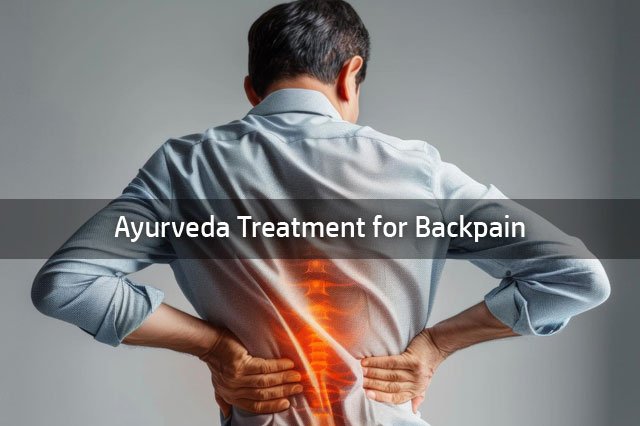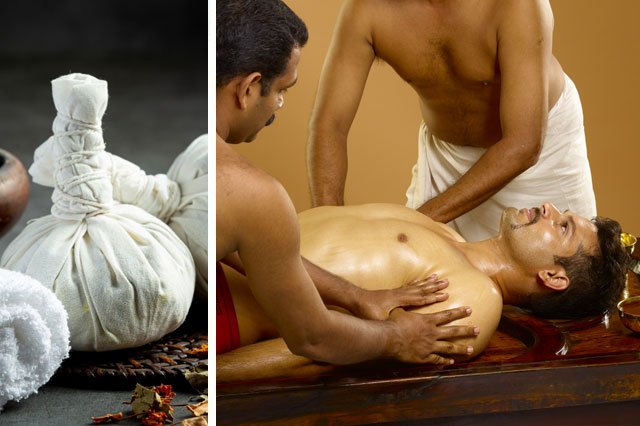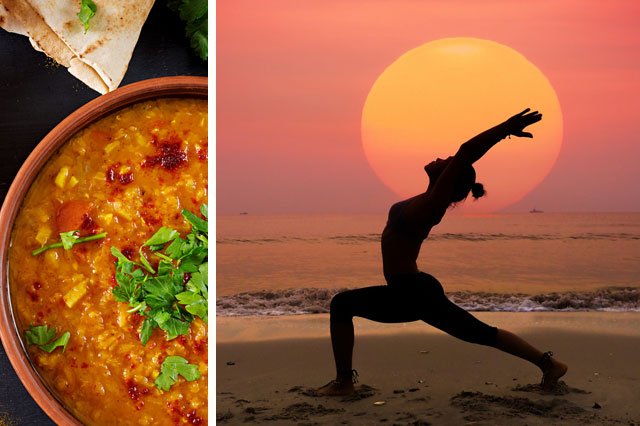
In Ayurveda, back pain is called Katishoola or Prishthashoola, and its root cause is primarily an imbalance of the Vata dosha - the bio-energy responsible for movement, nerve impulses, and dryness in the body.
Vata governs all movement in the body - muscles, joints, nerves, and circulation.
When Vata becomes imbalanced (due to wrong diet, lifestyle, or aging), it dries and weakens tissues, leading to stiffness, pain, and degeneration in the spine and surrounding muscles.
Common triggers for Vata aggravation:
Irregular eating and sleeping habits
Excessive physical work or long sitting
Exposure to cold and dry climates
Emotional stress and anxiety
Old age (natural increase of Vata)
Weak digestion (Agni) leads to formation of Ama - sticky, undigested waste that clogs body channels (srotas).
When Ama combines with aggravated Vata, it gets lodged in the lower back and joints, causing inflammation, stiffness, and pain.
Especially Asthi dhatu (bone) and Mamsa dhatu (muscle).
Poor nutrition, stress, or age can weaken these tissues, reducing the spine’s support and stability.
Leads to conditions like spondylosis, disc degeneration, or muscle fatigue.
4. Obstruction in Vata Pathways (Margavarana)
When channels that carry Vata are blocked by Kapha or Ama, Vata cannot move freely → sharp, radiating pain(often seen in sciatica or herniated disc).
Prolonged sitting, bending, or lifting heavy weights improperly.
Sedentary lifestyle or lack of regular stretching.
Mental stress (Vata imbalance is aggravated by worry and fear).

A dough ring is placed on the lower back and filled with warm medicated oil (e.g., Mahanarayan taila, Dhanwantaram taila).
Retained for 20–30 minutes to reduce stiffness, nourish discs, and pacify Vata dosha.
Daily or weekly warm oil massage, especially with Mahanarayan taila, Ksheerabala taila, or Sahacharadi taila.
Improves circulation, relaxes muscles, and reduces nerve pain.
Patra Pinda Sweda (leaf bundle fomentation): Relieves inflammation and strengthens back muscles.
Pizhichil (oil bath therapy): Warm medicated oil poured continuously over the body, good for chronic pain.
Basti (medicated enema): Considered the most effective for back pain since it directly pacifies Vata. A course of Anuvasana basti (oil enema) + Niruha basti (decoction enema) is often prescribed.
Yograj Guggulu - for joint/muscle pain, reduces Vata and Ama (toxins).
Mahayograj Guggulu – for chronic back pain, sciatica, arthritis.
Dashmool kwath – anti-inflammatory, good for Vata disorders.
Shallaki (Boswellia) and Guggulu (Commiphora mukul) – reduce stiffness and swelling.
Ashwagandha, Bala, Shatavari – strengthen nerves and muscles.
Favor warm, cooked, oily foods: ghee, soups, porridge, warm milk with turmeric.
Avoid dry, cold, raw foods: salads, cold drinks, excessive beans, and processed snacks (they aggravate Vata).
Include *anti-inflammatory spices: turmeric, ginger, garlic, cumin.
Stay hydrated with warm water or herbal teas (ginger tea, dashmool tea).

Yoga Asanas: Bhujangasana (Cobra pose), Makarasana (Crocodile pose), Setubandhasana (Bridge pose), Cat–Cow stretch—done gently, without strain.
Pranayama: Anulom Vilom (alternate nostril breathing), Bhramari (humming bee breath) to reduce stress and balance Vata.
Maintain correct posture while sitting/standing.
Avoid excessive bending, lifting heavy loads, or long hours of sitting without breaks.
Apply warm compress or hot water bag if pain worsens in cold weather.
Kati Basti + Abhyanga + Panchakarma therapies relieve stiffness and restore balance.
Herbal medicines strengthen tissues and reduce pain.
Diet & lifestyle prevent recurrence by pacifying Vata dosha.
This is a general outline. A proper Nadi Pariksha (pulse diagnosis) and examination by an Ayurvedic doctor helps personalize the treatment.
TC 53/1146(2), Avaduthura, Kovalam, Vizhinjam P.O., Kerala, Pin:695521, India

kovalam
Copyright © . The Ayur Villa Resort. All rights reserved.